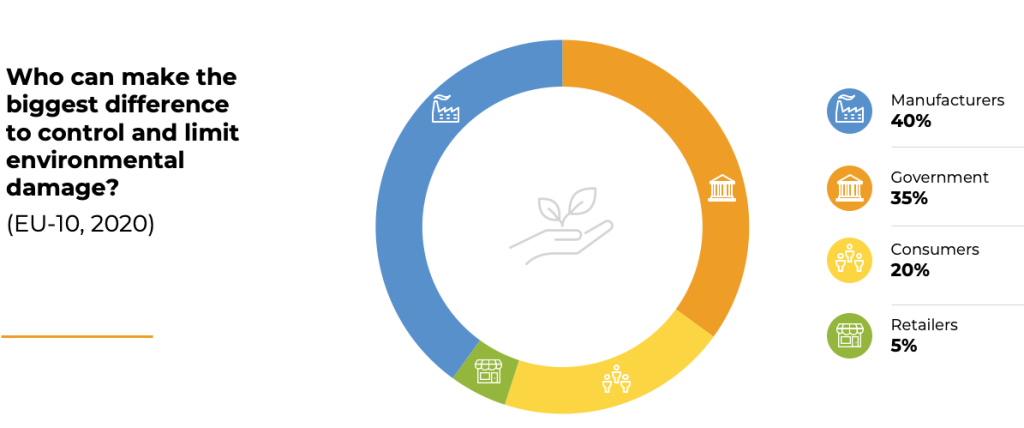Adapting to or mitigating climate change disruptions will raise production costs. Today’s catch-22 question is whether consumers will accept to pay a premium and save the bottom line or whether climate change will scrap business margins.
As climate change is becoming a reality for consumers across the globe, they feel that manufacturers must tackle this life-threatening challenge. Yet, most shoppers prefer cutting consumption. Only a few consumers are ready to pay a premium for environmentally friendly products or services. Moreover, frugality is becoming aspirational. Super consumers are no longer seen as trendsetters.
Climate change is happening
As the Intergovernmental Panel on Climate Change (IPCC) reminded us in August 2021 (once again), climate change is “widespread, rapid and intensifying”. Extreme weather events are unfolding in both hemispheres and on all continents. Who would have believed that:
- a small town in Canada (Lytton) could burn down following an extreme heatwave (49.6°C or 121.3°F)?
- Some 240 people would die of massive rainfalls and inundations in countries such as Germany or Belgium?
Everybody can now feel – first-hand – the dramatic impacts of climate change, which is increasingly perceived as a life-threatening crisis. According to a recent survey of 10,000 youngsters (16-25 y.o.) from across the globe, 60% of youth feels ‘very’ or ‘extremely’ worried about climate change.
More than half said climate change made them feel ‘afraid, sad, anxious, angry, powerless, helpless, and/or guilty’. The study concluded that there’s a correlation between negative emotions (i.e. anxiety) and beliefs that government responses to climate change have been inadequate.
Manufacturers must tackle the challenge
Meanwhile, it’s not just up to governments to implement solutions. According to respondents in Kantar’s Global Survey 2020, it’s up to manufacturers (40%) to take on the climate change challenge.
In Europe, according to the July 2021 Eurobarometer survey, close to six in ten respondents think that business and industry (58%) are responsible for tackling climate change. This figure has gone up by 7 percentage points in just two years. It was at 38% in 2017. These figures can convey a form of distrust vis-à-vis multinational corporations not living up to their climate pledges. They can also translate a strong trust in the horsepower corporations can bring to the fight against global warming.
Most brands and industries are implementing plans to reduce their environmental footprint, namely in fashion, food and catering, packaging, transport. They are switching to renewable energy sources, increasing their recycling rates, decreasing their use of plastics. These measures are effective but costly. There are inevitably driving production costs up and driving consumer prices up.
Most consumer are not ready to compromise when buying sustainable products or services. They’re not ready to give up on quality and only ‘eco-actives’ are ready to pay a premium. On a global level, 20% of consumers are considered ‘eco-active’ (Kantar’s Global Survey 2020). In Europe, eco-actives account for 24% of consumers, with figures ranging from 18% in Czechia and 38% in Germany. They represent 17% of consumers in the United States, 18% in Latin America, and 10% in Asia (namely China, Indonesia and Vietnam).
Save, reject, avoid, reduce, reuse, repair
That leaves an overwhelming majority of consumers who are not ready to pay a premium. In October 2020, InSites Consulting surveyed how European consumers were responding to climate change. They proposed 21 actions that consumers could choose from. The most favoured options include verbs such as ‘reject’, ‘avoid’ and ‘reduce’ – or – ‘reuse’ and ‘repair’, rather than consuming green and paying a premium.
Among them, 9 options reflected a readiness among European consumers to cut on consumption. Surveyed consumers said they were:
-
- Refusing plastic bags – 71%
- Reducing energy use at home – 69%
- Avoiding single use plastics – 69%
- Limiting water usage – 68%
- Consuming less in general – 61%
- Avoiding fast fashion – 52%
- Not buying water in plastic bottles – 51%
- Eating less meat – 50%
Many respondents are also more active in reusing or recycling. Respondents declare that they were:
-
- Using up leftovers – 81%
- Recycling at home – 80%
- Mending & repairing rather than replacing – 61%
- Composting waste – 57%
Behind reducing consumption and minimising waste, there is an aspiration for frugality (see the surge in app downloads and Google searches on ‘fasting’). How Europeans consume mobility solutions also illustrates this trend. In 2020, EU and UK passenger car registrations have plummeted by 24% (Source: ACEA). There were only 11,6 million cars sold in 2020 against 15,3 million a year earlier. Meanwhile, 22 million bikes (+52% YoY) were sold in the same geographical zone. 4,5 million of these bikes were electric and sold at an average price of 2600 EUR (Source: CONEBI).
Consumers seem to be ready to consume less (decreasing sales) or find alternatives (electric bikes). Businesses should expect radical swings in consumer behaviours in the coming decades. In the eyes of consumers, consumption is increasingly linked to climate change.






